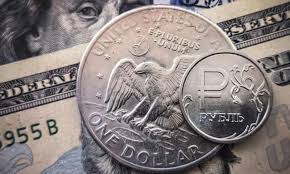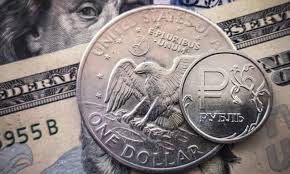
On Friday, Russia accelerated two payments on its international debt in the latest move to avoid a default that has been looming since its invasion of Ukraine.
Russia's finance ministry said it has wired $71.25 million for a dollar-denominated bond and 26.5 million euros ($28 million) for euro-denominated notes a week before the interest payments are due and just five days before a critical US permit authorising such transfers expires.
Since the West implemented sweeping sanctions in response to Russia's invasion of Ukraine on February 24, the country has been on the verge of default. The country has been cut off from the rest of the world's financial system, with almost half of its $640 billion in foreign reserves frozen.
Russia, which has retaliated with some counter-measures of its own, has been able to keep paying until now because of a special licence from the U.S. Treasury,which allows international bond holders to receive these kinds of payments.
However, that exemption is set to expire on May 25, and US Treasury Secretary Janet Yellen indicated this week that it will not be renewed.
"They are kicking the can down the road," said Kaan Nazli at asset managers Neuberger Berman, who holds some Russian sovereign bonds.
In recent months, the country's $40 billion in international bonds, nearly half of which are held by foreign investors, have become a flashpoint.
Russia appeared to be willing to postpone payments to foreign investors unless it was allowed to spend its frozen reserves overseas at first, but that appears to have changed.
"The strategy turned into Russia not wanting to be the party to blame for the default," said Nazli.
The cash had been received by Russia's national settlement depository, which serves as a payment agent for the two bonds, according to the finance ministry.
It was unclear whether the payments would reach overseas holders of the two Russian Eurobonds, which is generally a multistep process involving international banks and clearing institutions.
A request for comment from JPMorgan, which formerly served as a correspondent bank for such transfers, was not immediately returned. The US Treasury was unavailable for comment.
Russian Finance Minister Anton Siluanov said on Wednesday that if the US bans other choices, Moscow would service its external debt commitments in roubles and will not declare default because it has the financial wherewithal to do so.
Despite the numerous restrictions, Russia has managed to pay seven bonds since its invasion of Ukraine, including the most recent interest payments.
However, it appears more doubtful that the US Office of Foreign Assets Control (OFAC) will renew Russia's licence to make the payments. While no final decision had been made, Treasury Secretary Yellen stated on Wednesday that it was "unlikely that it would continue."
Those in favour of the extension say that enabling Russia to service its debt will deplete its war reserve by forcing Moscow to pay creditors with hard-currency profits.
Opponents argue that Russia has less than $2 billion in external debt payments due by the end of the year, which pales in comparison to Moscow's oil and gas revenue of about $28 billion in April alone, thanks to strong energy prices.
Following the payment on May 27, there are two further Eurobond payments due on June 23 totaling $235 million.
"This is delaying the inevitable," said Petar Atanasov, co-head of sovereign research at Gramercy, a specialist emerging market debt fund. "At some point they will not be able to make the payments anymore."
(Source:www.usnews.com)
Russia's finance ministry said it has wired $71.25 million for a dollar-denominated bond and 26.5 million euros ($28 million) for euro-denominated notes a week before the interest payments are due and just five days before a critical US permit authorising such transfers expires.
Since the West implemented sweeping sanctions in response to Russia's invasion of Ukraine on February 24, the country has been on the verge of default. The country has been cut off from the rest of the world's financial system, with almost half of its $640 billion in foreign reserves frozen.
Russia, which has retaliated with some counter-measures of its own, has been able to keep paying until now because of a special licence from the U.S. Treasury,which allows international bond holders to receive these kinds of payments.
However, that exemption is set to expire on May 25, and US Treasury Secretary Janet Yellen indicated this week that it will not be renewed.
"They are kicking the can down the road," said Kaan Nazli at asset managers Neuberger Berman, who holds some Russian sovereign bonds.
In recent months, the country's $40 billion in international bonds, nearly half of which are held by foreign investors, have become a flashpoint.
Russia appeared to be willing to postpone payments to foreign investors unless it was allowed to spend its frozen reserves overseas at first, but that appears to have changed.
"The strategy turned into Russia not wanting to be the party to blame for the default," said Nazli.
The cash had been received by Russia's national settlement depository, which serves as a payment agent for the two bonds, according to the finance ministry.
It was unclear whether the payments would reach overseas holders of the two Russian Eurobonds, which is generally a multistep process involving international banks and clearing institutions.
A request for comment from JPMorgan, which formerly served as a correspondent bank for such transfers, was not immediately returned. The US Treasury was unavailable for comment.
Russian Finance Minister Anton Siluanov said on Wednesday that if the US bans other choices, Moscow would service its external debt commitments in roubles and will not declare default because it has the financial wherewithal to do so.
Despite the numerous restrictions, Russia has managed to pay seven bonds since its invasion of Ukraine, including the most recent interest payments.
However, it appears more doubtful that the US Office of Foreign Assets Control (OFAC) will renew Russia's licence to make the payments. While no final decision had been made, Treasury Secretary Yellen stated on Wednesday that it was "unlikely that it would continue."
Those in favour of the extension say that enabling Russia to service its debt will deplete its war reserve by forcing Moscow to pay creditors with hard-currency profits.
Opponents argue that Russia has less than $2 billion in external debt payments due by the end of the year, which pales in comparison to Moscow's oil and gas revenue of about $28 billion in April alone, thanks to strong energy prices.
Following the payment on May 27, there are two further Eurobond payments due on June 23 totaling $235 million.
"This is delaying the inevitable," said Petar Atanasov, co-head of sovereign research at Gramercy, a specialist emerging market debt fund. "At some point they will not be able to make the payments anymore."
(Source:www.usnews.com)














